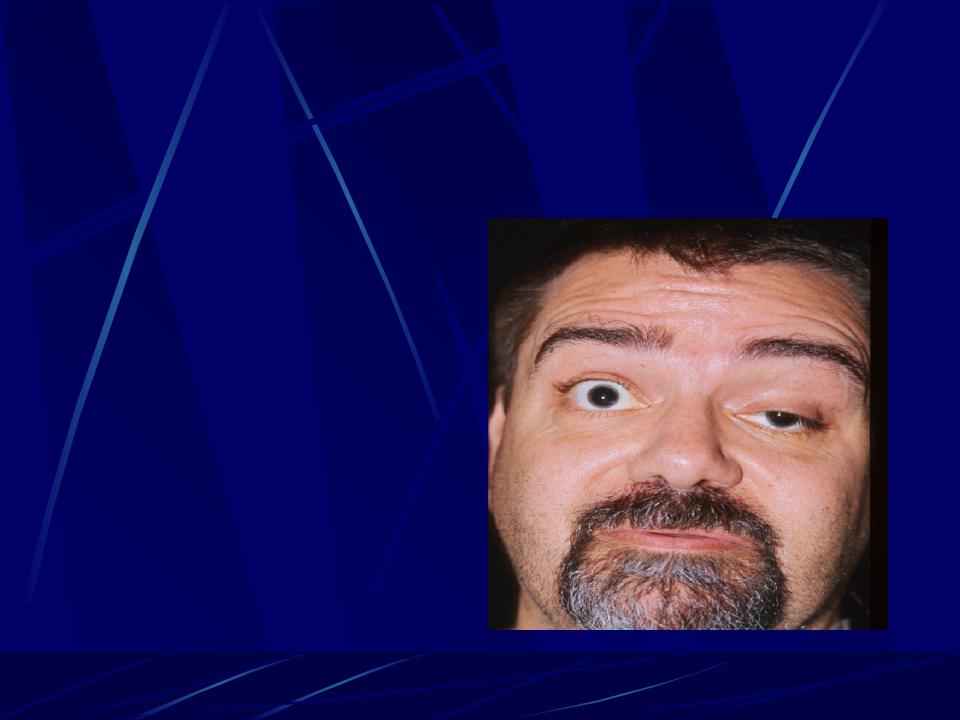
- •Chapter 43: Central and
- •Increased Intracranial
- •Increased Intracranial pressure
- •Increased Intracranial
- •Level Of Consciousness
- •Headache
- •Vomiting and ICP
- •Papilledema
- •Posturing
- •Symptoms of ICP
- •Vital signs
- •Medical and surgical management
- •Medical & surgical management
- •Medical Management
- •Normal ICP In the
- •Nursing care ICP
- •Nursing Care ICP
- •Nursing Care ICP
- •Nursing Care ICP
- •Nursing Care ICP
- •Activities That increase ICP
- •Activities that increase ICP
- •Nursing Care ICP
- •Nursing Care ICP
- •Infectious & Inflammatory
- •Meningitis (Covering of the Brain) pg
- •Meningitis
- •Meningitis S/S
- •Kernig’s Sign
- •Brudzinsi’s Sign
- •Diagnostic findings: Meningitis
- •Medical Management
- •Encephalitis
- •Encephalitis (brain inflammation)
- •Encephalitis
- •Encephalitis
- •Encephalitis
- •Encephalitis--brain inflammation
- •Encephalitis
- •Guillain-Barre’ syndrome Pg.677
- •Guillain-Barre’ Syndrome
- •Guillain Barre’ Syndrome
- •Medical Management
- •Nursing Management
- •Brain abscess Pg. 678
- •Brain abscess
- •Brain abscess
- •Brain abscess
- •General Nursing Care for Inflammatory Disorders
- •Nursing Care for Inflammatory Disorders
- •Neuromuscular disorders PG 678
- •Multiple sclerosis PG 678
- •Multiple sclerosis
- •Multiple sclerosis
- •Multiple sclerosis
- •Multiple sclerosis
- •Drugs for MS
- •Nursing
- •Myasthenia Gravis pg 681
- •Myasthenia Gravis
- •Myasthenia Gravis
- •Myasthenia gravis
- •Mestinon or Mytelase
- •Amyotrophic Lateral
- •Amyotrophic Lateral
- •Cranial Nerve disorders Pg. 683
- •Trigeminal Neuralgia (Tic
- •Trigeminal Neuralgia (Tic douloureux) pg 683
- •Trigeminal Neuralgia
- •Trigeminal Neuralgia
- •Trigeminal Neuralgia
- •Trigeminal Neuralgia
- •Trigeminal Neuralgia (Tic
- •Trigeminal Neuralgia
- •Bell’s Palsy
- •Bell’s Palsy
- •Bell’s Palsy
- •Bell’s palsy
- •Temporomandibular
- •TMD Medical
- •TMD Medical
- •Extrapyramidial disorders pg 686
- •Parkinson’s
- •Parkinson’s
- •Parkinson’s
- •Parkinson’s
- •Parkinson’s
- •Huntington’s Disease pg. 689
- •Huntington’s
- •Huntington’s
- •Huntington’s
- •Huntington’s chorea
- •Nursing care extrapyramidial 43-2 pg
- •Nursing Care extrapyramidial
- •Seizure disorders pg 692
- •Seizure disorders
- •Seizure disorders
- •Seizure disorder
- •Seizures
- •Generalized seizure
- •Seizure--Grand mal
- •Grand mal seizure
- •During a seizure
- •During a Seizure
- •After a seizure
- •Nursing
- •Nursing
- •Status Epilepticus
- •Medications for seizures
- •Brain Tumor pg. 697
- •Brain tumor
- •Brain Tumor
- •Brain Tumor

Multiple sclerosis
 Myelin sheath swells (exacerbation) when it is deteriorating
Myelin sheath swells (exacerbation) when it is deteriorating
 when swelling goes down then there is a remission
when swelling goes down then there is a remission
 may go for years without symptoms
may go for years without symptoms
 each exacerbation causes the symptoms to last longer and more severe
each exacerbation causes the symptoms to last longer and more severe

Multiple sclerosis
 Weakness of arms and legs may progress to paraplegia
Weakness of arms and legs may progress to paraplegia
 may be incontinent
may be incontinent
 visual disturbances may eventually progress to blindness
visual disturbances may eventually progress to blindness
 infection and emotional upsets may cause exacerbations
infection and emotional upsets may cause exacerbations
 NO CURE
NO CURE

Multiple sclerosis
 Intellectual functioning may be impaired late in disease
Intellectual functioning may be impaired late in disease
 loss of memory, impaired judgment
loss of memory, impaired judgment
 shallow breathing can cause pneumonia (most common cause of death)
shallow breathing can cause pneumonia (most common cause of death)
 may live 20 years with the disease
may live 20 years with the disease

Drugs for MS
 Lioresal and Dantrium--muscle spasticity and rigidity
Lioresal and Dantrium--muscle spasticity and rigidity
 Antibiotics, urinary infectives, tranquilizers for mood swings
Antibiotics, urinary infectives, tranquilizers for mood swings
 Ditropan---urinary incontinence
Ditropan---urinary incontinence
 Urecholine for retention
Urecholine for retention  Steroids
Steroids

Nursing
 Sensory impairment: be careful with hot, cold, avoid injury
Sensory impairment: be careful with hot, cold, avoid injury
 REST, conserve energy
REST, conserve energy
 Polyunsaturated fate, linoleic acid-- found in sunflower oil may help
Polyunsaturated fate, linoleic acid-- found in sunflower oil may help

Myasthenia Gravis pg 681
 Disorder of muscles, with increasing fatigue and weakness as muscles are used
Disorder of muscles, with increasing fatigue and weakness as muscles are used
 Fatigue appears to be caused by a defect in nerve impulses from nerve endings to muscles
Fatigue appears to be caused by a defect in nerve impulses from nerve endings to muscles
 Receptor sites destroyed
Receptor sites destroyed  Thought to be autoimmunne
Thought to be autoimmunne

Myasthenia Gravis
 Most common symptoms are ptosis of eyelids, difficulty chewing and swallowing, diplopia, voice weakness, masklike facial expressions and weakness of arms and legs
Most common symptoms are ptosis of eyelids, difficulty chewing and swallowing, diplopia, voice weakness, masklike facial expressions and weakness of arms and legs
 May affect respirations
May affect respirations

Myasthenia Gravis
 Diagnosed by giving IV Tensilon which relieves symptoms in a few seconds if it is Myasthenia
Diagnosed by giving IV Tensilon which relieves symptoms in a few seconds if it is Myasthenia
 Chest x-ray may show tumor of thymus
Chest x-ray may show tumor of thymus

Myasthenia gravis
 Treatment is Mesitonon or Myelelase
Treatment is Mesitonon or Myelelase
 Atropine is antidote for mestinon and other anticholinesterase drugs
Atropine is antidote for mestinon and other anticholinesterase drugs
 Thymus gland may be surgically removed as it may cause destruction of nerve endings
Thymus gland may be surgically removed as it may cause destruction of nerve endings

Mestinon or Mytelase
 Observe for drug overdose….abdominal cramps, clenched jaws, muscle rigidity
Observe for drug overdose….abdominal cramps, clenched jaws, muscle rigidity
 Give drug at exact intervals to maintain therapeutic blood levels
Give drug at exact intervals to maintain therapeutic blood levels
 Watch for resp distress if drugs not affective
Watch for resp distress if drugs not affective
 May aspirate as cannot swallow
May aspirate as cannot swallow
